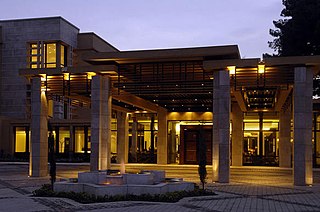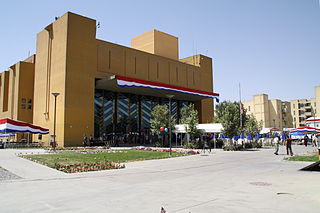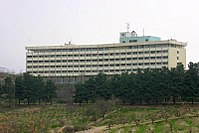
The Taliban insurgency began after the group's fall from power during the 2001 War in Afghanistan. The Taliban forces fought against the Afghan government, led by President Hamid Karzai, and later by President Ashraf Ghani, and against a US-led coalition of forces that has included all members of NATO; the 2021 Taliban offensive resulted in the collapse of the government of Ashraf Ghani. The private sector in Pakistan extends financial aid to the Taliban, contributing to their financial sustenance.

Operation Mountain Fury was a NATO-led operation begun on September 16, 2006 as a follow-up operation to Operation Medusa, to clear Taliban insurgents from the eastern provinces of Afghanistan. Another focus of the operation was to enable reconstruction projects such as schools, health-care facilities, and courthouses to take place in the targeted provinces.

The 2008 Kabul Serena Hotel attack was an attack on the gym of the Kabul Serena Hotel, in Kabul, Afghanistan on January 14, 2008, for which the Taliban claimed responsibility.

The Haqqani network is an Afghan Islamist group, built around the family of the same name, that has used asymmetric warfare in Afghanistan to fight against Soviet forces in the 1980s, and US-led NATO forces and the Islamic Republic of Afghanistan government in the 21st century. It is recognized as a terrorist organization by the United Nations. It is considered to be a "semi-autonomous" offshoot of the Taliban. It has been most active in eastern Afghanistan and across the border in north-west Pakistan.
The 2009 UN guest house attack happened in the early hours of October 28, 2009, in Kabul, Afghanistan. 3 Taliban attackers stormed a guest house used by the United Nations, killing five UN staff, two Afghan security personnel and an Afghan civilian.
The February 2010 Kabul attack on 26 February 2010 was a combined suicide bombing and shooting attack. A car bomb levelled the Arya Guesthouse, also known as the Hamid Guesthouse, popular with Indian doctors. Two armed attackers then entered the nearby Park Residence, housing other foreigners. One detonated a suicide bomb, and the other was shot dead. The Safi Landmark Hotel nearby was badly damaged by the blasts. At least 18 people were killed and 36 more were injured.
The May 2010 Kabul bombing occurred on May 18, 2010, in Kabul, Afghanistan. 18 people, including 5 US soldiers and a Canadian soldier, were killed and 52 were injured when a NATO convoy was targeted by a Taliban suicide attacker. It was the deadliest attack against NATO forces in Afghanistan since September 2009, when six Italian soldiers were killed by a suicide bomber. Two full colonels and two lieutenant colonels were killed in this attack, making it the deadliest attack against ranking officers in Afghanistan. With this attack, the total number of Americans killed in Afghanistan crossed one thousand.
Events from the year 2011 in Afghanistan.

Events from the year 2012 in Afghanistan.

The April 2012 Afghanistan attacks took place on Sunday, 15 April 2012, at around 13:00 local time when heavily armed Taliban insurgents and suicide bombers launched multiple coordinated attacks throughout Afghanistan. Insurgents launched the 2012 spring offensive on multiple locations, including government buildings, military bases, and embassies. Attacks occurred in four Afghan provinces, including Kabul and Paktia. Different reports attribute responsibility for the attacks to either Taliban or the Haqqani network although the Taliban have claimed responsibility.
The following lists events from 2014 in Afghanistan.
The following lists events that happened in 2013 in Afghanistan.
The following lists events that happened during 2015 in Afghanistan.
The following lists events that happened during 2016 in Afghanistan.
The September 2011 Kabul attack occurred when Taliban fighters attacked multiple locations in Kabul, Afghanistan including the US Embassy and NATO headquarters, on 13 September 2011. The insurgents and at least seven others were killed and 15 were wounded. It was the first incident in the capital in which widely separated targets came under simultaneous attack. Elements within the Afghan and Pakistan governments were suspected of complicity in the attacks.
Events in the year 2017 in Afghanistan.
Events in the year 2018 in Afghanistan.

On 20 January 2018, a group of four or five gunmen attacked the Inter-Continental Hotel in Kabul, Afghanistan, sparking a 12-hour battle. The attack left 40 people dead including fourteen foreigners, while 14 were injured.
Mullah Taj Mir Jawad, also spelt Tajmir Jawad, is the Deputy Director of Intelligence of the Islamic Emirate of Afghanistan since 7 September 2021, alongside Rahmatullah Najib. He is a senior leader of the Haqqani network.







